The latest issue of the Bulletin of the Russian Far Eastern Malacological Society (2025, vol. 28, No. 2) has been published. It is a special issue entitled Essays on the History of Russian Malacology (Guest Editors: Prof. M.V. Vinarsky (Saint Petersburg State University and the Saint Petersburg Branch of the S.I. Vavilov Institute for the History of Natural Science and Technology, Russian Academy of Sciences), Dr. K.A. Lutaenko (A.V. Zhirmunsky National Scientific Center of Marine Biology, Far Eastern Branch of the Russian Academy of Sciences), and Dr. I.O. Nekhaev (Saint Petersburg State University). This issue is dedicated to the 300th anniversary of the Russian Academy of Sciences, the 55th anniversary of the NSCMB FEB RAS, and the 30th anniversary of the RFEMS. The issue contains seven articles on the history of malacology in Russia, among them are extensive reviews, including those on the state of knowledge of mollusks, and contain a useful and comprehensive bibliography: M.V. Vinarsky, “Three Hundred Years of Malacology in Russia (on the 300th Anniversary of the Russian Academy of Sciences),” I.O. Nekhaev, “Shell-bearing Gastropods of the Eastern Arctic: Historical Aspects and Current State of Knowledge,” and K.A. Lutaenko, “The History of the Study of Bivalves in the Russian Part of the Sea of Japan.” The article by M.V. Vinarsky examines the main stages in the development of malacological research in Russia, from the era of Peter the Great to the present day. It characterizes the activities of leading scientists and scientific schools in the field of malacology, provides quantitative data reflecting the dynamics of the growth of museum collections and the number of actively working malacologists in different historical periods, and discusses the role of the Academy of Sciences and academic institutions in organizing and institutionalizing malacological research in Russia. The review by I.O. Nekhaev (in English) systematizes knowledge about the history and current state of research on shell-bearing gastropods of the eastern Arctic seas, the role of marine biological stations in describing Arctic mollusks, studying their ecology and proposing hypotheses about the factors influencing the distribution of marine fauna. Russian studies, unlike earlier Scandinavian ones, focused on faunistic and ecological aspects, as well as on changes in invertebrate ranges caused by climate, long before this topic became global. In an extensive article by K.A. Lutaenko (170 pages), set against a broad background of natural history research, expeditions and zoological collections in the Russian part of the Sea of Japan, the history of the study of the fauna and taxonomy of bivalve mollusks of the region, starting from the 18th century, is presented and five stages of malacological research are identified, which partially overlap: (1) the first malacological studies (before mid-19th century); (2) second half of the 19th century – early 1920s (the era of Schrenck and the initial accumulation of collections); (3) 1920s – early 1950s (the early Soviet era of expeditions); (4) 1950s – mid-1980s (the "golden years" and the Scarlato era); (5) 1970s – present (the "Far Eastern researcher’s period"). The role of the Institute of Marine Biology/National Scientific Center for Marine Biology in promoting faunistic and taxonomic research on Bivalvia is emphasized, as a result of which it has become a recognized world center for malacology. The studies of Cenozoic mollusks and archaeomalacofaunas of Primorye and Sakhalin are also briefly described, lists of the main expeditions are provided, and biographical data on malacologists and collectors are included. Portraits of collectors, photographs of ships, sampling maps, photographs of mollusks from historical collections, and an extensive bibliography are presented. Other articles in the issue are devoted to the activities of Georgy Filippovich Gerstfeld (1827-1862), a researcher of the Siberian and Russian Far East fauna (T.Ya. Sitnikova, L.A. Prozorova); a review of the fauna of gastropods of the order Cephalaspidea (Gastropoda) of the Far Eastern seas of Russia and adjacent parts of the Pacific Ocean, with a brief outline of the history of the study (E.M. Chaban); the history of the study of the terrestrial malacofauna of Belarus (A.M. Ostrovsky, K.V. Zemoglyadchuk); and the study of the fauna of terrestrial mollusks of the western part of Russia (E.V. Shikov). Additionally, in the sections "Chronicle" and "Losses of Science", articles are published on the occasion of the 30th anniversary of the RFEMS, the 40th anniversary of the Malacological Society of Korea, the anniversary of the renowned zoologist and popularizer of malacology Prof. R.N. Burukovsky, and an obituary of E.N. Egorova, a researcher of Antarctic mollusks.
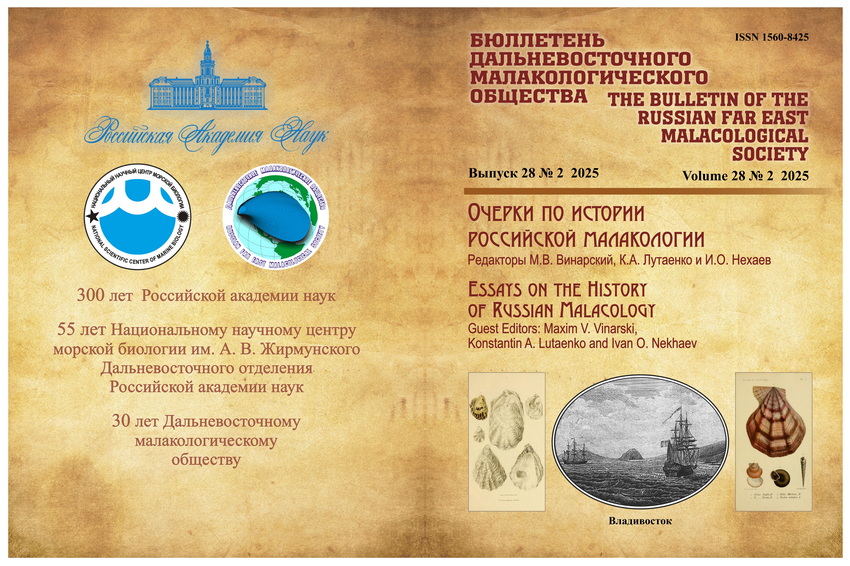
This is the first special collection of papers on the history of malacology published in Russia, prepared by a team of renowned specialists in various groups of terrestrial, marine and freshwater mollusks. This publication of the RFEMS continues the society's activities in publishing historical materials that previously appeared in its journal. The editorial board and editors of the special issue are grateful to the NSCMB FEB RAS for long-term support of the RFEMS initiatives and its publications.
Announcements and information about the publication are posted on the website of the NSCMB FEB RAS (http://www.imb.dvo.ru/index.php/ru/prochie-novosti-i-ob-yavleniya/2347-pervyj-v-rossii-spetsialnyj-sbornik-opublikovany-ocherki-po-istorii-rossijskoj-malakologii) and the scientific information portal "Poisk" (https://poisknews.ru/anonsy/opublikovany-ocherki-po-istorii-rossijskoj-malakologii/).
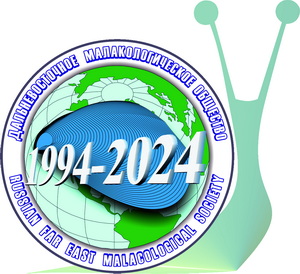 In October 2024, the Russian Far East Malacological Society (RFEMS) celebrated its 30th anniversary. The RFEMS became the second scientific society in Russia to study mollusks; the first was the Russian Malacological Society, established in 1992. On October 18, 2024, a ceremonial meeting dedicated to the 30th anniversary of the Russian Far East Malacological Society was held at the A.V. Zhirmunsky National Scientific Center of Marine Biology, Far Eastern Branch of the Russian Academy of Sciences.
In October 2024, the Russian Far East Malacological Society (RFEMS) celebrated its 30th anniversary. The RFEMS became the second scientific society in Russia to study mollusks; the first was the Russian Malacological Society, established in 1992. On October 18, 2024, a ceremonial meeting dedicated to the 30th anniversary of the Russian Far East Malacological Society was held at the A.V. Zhirmunsky National Scientific Center of Marine Biology, Far Eastern Branch of the Russian Academy of Sciences.
On June 20–21, 2024, the Soonchunhyang University, Asan, Republic of Korea, hosted an annual conference of the Malacological Society of Korea (MSK) and an anniversary event to celebrate 40 years of the Society (http://malacol.or.kr/2024.html).
World Congress of Malacology in Munich, Germany 1st – 5th August 2022
New from the MNHN Malacology Lab (Paris) for 2019.
Congratulation letter from Ngo Xuan Quang (Institute of Tropical Biology, Vietnam Academy of Science and Technology) on the occasion of 25th Anniversary celebration of the RFEMS founding.
View Poster (in Russian)
International Seminar on Biodiversity and Evolution of Mollusks, September 26-27, 2019, Vladivostok, Russia.
International Seminar on Biodiversity and Evolution of Mollusks, September 26-27, 2019, Vladivostok, Russia.
Two members of the Russian Far East Malacological Society published an important contribution to the chiton fauna of China, little-known until that: Dr. Zhang Junlong (Institute of Oceanology CAS, Qingdao) and Dr. Boris I. Sirenko (Zoological Institute RAS, St. Petersburg). Their paper deals with the chiton fauna of Hainan Island and was published in Zootaxa https://biotaxa.org/Zootaxa/article/view/zootaxa.4564.1.1.
Based on their cooperative study on samples from this expedition and historical collections, they comprehensively reported the fauna of the living chitons from this area for the first time.The present results showed that a total of 30 species belonging to 18 genera in seven families were recognized in the vicinity of Hainan Island by careful examination of valves, radulae, girdles and other morphological characters. Six species were reported for the first time from this area, i.e., Rhyssoplax venusta, Lucilina lamellosa, L. tenuicostata, L. tilbrooki, Onithochiton stracki and Acanthochitona intermedia. Several species names were also corrected: Craspedochiton laqueatus previously reported from there was re-identified as Acanthochitona lanae; Notoplax (Notoplax) sp. and Notoplax (Notoplax) formosa were both re-identified as Acanthochitona britayevi; Notoplax doederleini was re-identified as Acathochitona achates. In additions, Callochiton sp. and Plaxiphora sp. were identified as Callochiton multidentatus and Plaxiphora bucklandnicksi, respectively. Acanthochiton sp. from Xisha Islands was identified as A. intermedia. Acanthochitona rubrolineata and Acanthochitona bednalli were excluded from distribution to the South China Sea (http://english.qdio.cas.cn/Research2016/Research_Progress2016/QSDM2016/201904/t20190418_208565.html).
Congratulations to our colleagues with important contribution to malacology!
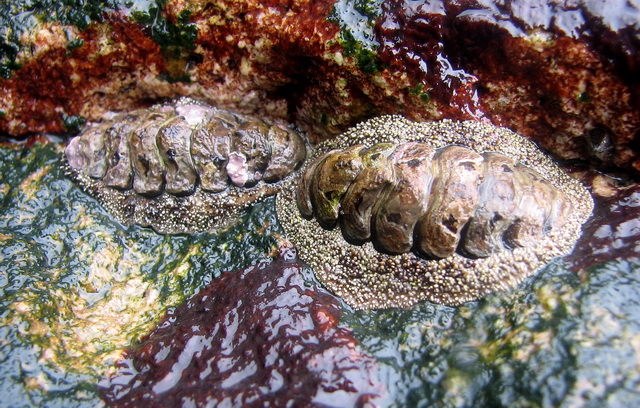
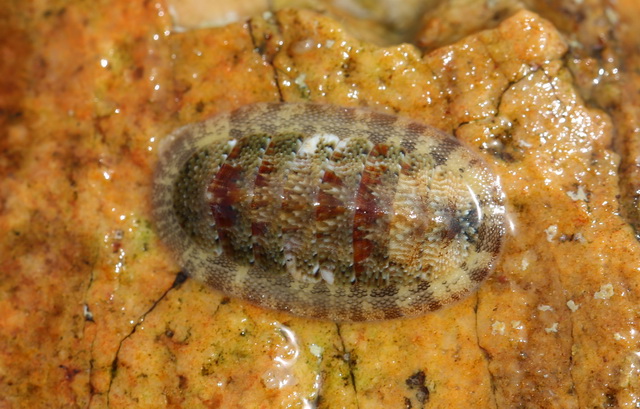
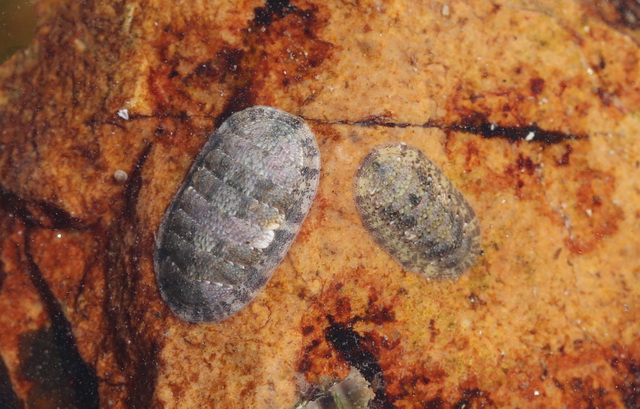
New from the MNHN Malacology Lab (Paris) for 2018.
International Seminar on Biodiversity and Evolution of Mollusks, September 26-27, 2019, Vladivostok, Russia.
The University Museum of Bergen (University of Bergen, Norway), Shirshov Institute of Oceanology (Russia), National Scientific Center of Marine Biology, Russian Academy of Sciences (Russia), and ForBio (Research School in Biosystematics) jointly offer an International Course on Systematics, Morphology and Evolution of Marine Molluscs.
Time and place: 17 - 27 September, 2019, Marine Biological Station "Vostok", Primorsky Krai, Russia.
Visits of malacologists to the Russian Far East Malacological Society in 2018.
View photo report (in Russian)
News from the Malacology Lab. of the MNHN (Paris) for 2017.
The International Workshop "Interdisciplinary Approaches to the Study of Human and Mollusc Interactions: from Prehistory to Present" is organized by the French National Museum of Natural History [Museum National d’Histoire Naturelle] in partnership with the National Fisheries College of Papua New Guinea.
The Annual Meeting of the Russian Far East Malacological Society (RFEMS) was held on December 8, 2017. The annual report of the RFEMS was presented and approved by the meeting, and awards to some members of the RFEMS were bestowed (best papers awards)
A review paper of the RFEMS members (V.V. Bogatov, L.A. Prozorova) devoted to an important regional fauna is published: TAXONOMY AND DIVERSITY OF FRESHWATER BIVALVE MOLLUSKS (MOLLUSCA, BIVALVIA) OF CHINA.
The article is posted with the permission of the authors.
National Scientific Center of Marine Biology FEB RAS, Russian Far East Malacological Society and Far Eastern Federal University have published a new book:
K.A. Lutaenko and I.E. Volvenko. Atlas of Common Bivalve Mollusks of Peter the Great Bay (Sea of Japan). - Vladivostok: FEFU, 2017. 140 p. [in Russian].
This atlas of common bivalve mollusks of Peter the Great Bay includes photographic images of 133 species belonging to 38 families constituting more than 80% of the total species richness of bivalves of the bay. The book is intended for a quick visual identification of common intertidal and subtidal bivalve species of Peter the Great Bay and northern Sea of Japan. The atlas is preceded by a brief geographical description of the bay for the purpose of understanding of molluscan habitats and faunal diversity, a brief description of shell characteristics and a general faunal account. A list of books for further reading and index of Latin names are provided.
1-3 November 2017 on the basis of Belgorod State National Research University will be held All-Russian Scientific Conference with International Participation, dedicated 100th anniversary of I. M. Likharev and P. V. Matekin - Current issues in modern malacology.
News from the Malacology Lab of the MNHN (Paris) for 2016.
Dear Colleagues,
It is our great pleasure to announce the next ISOLBE meeting being held at Tjarno, Sweden August 2017. Please see attached flyer and save the date.
Dutch Malacological Society updated its website and issued a release.
News and updates from the Malacology Lab of the MNHN (Paris) received from Philippe Bouchet.
World Congress of Malacology (Penang Island, Malaysia 18 - 24 July 2016).
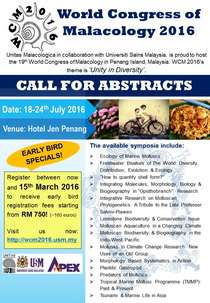
5th International Malacological Conference "MOLLUSKS: RESULTS, PROBLEMS, AND PERSPECTIVES OF RESEARCH" will be held at the Zhytomyr Ivan Franko State University, Faculty of Natural Science, Ukraine, from 6th to 7th of October 2016.
A new online resource (database) on molluscs: MolluscaBase (http://www.molluscabase.org/).
MolluscaBase is a taxonomically oriented database which aims to provide an authoritative, permanently updated account of all molluscan species.
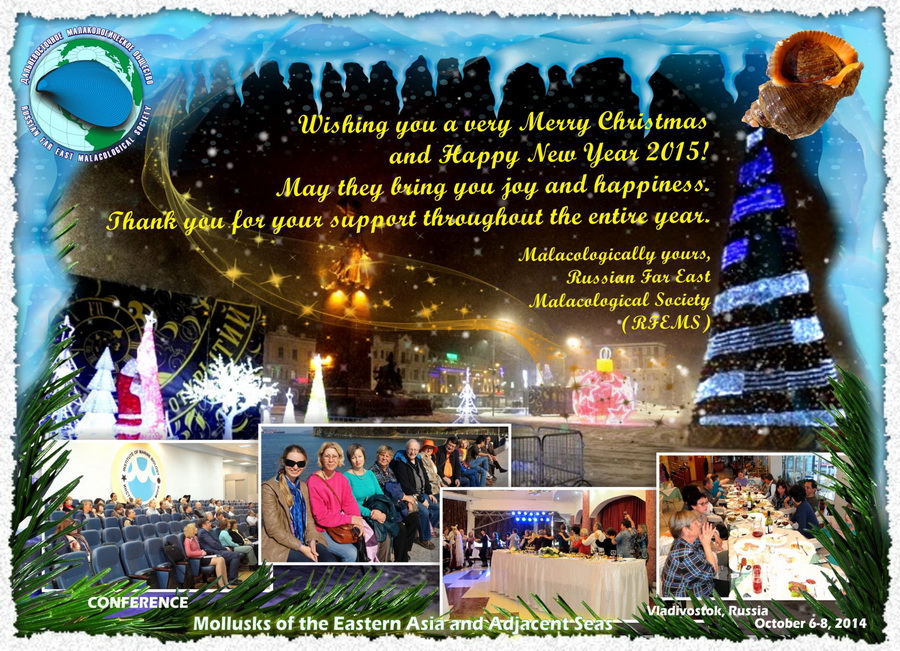
The Russian Far East Malacological Society (RFEMS), jointly with the A.V. Zhirmunsky Institute of Marine Biology, Far East Branch of the Russian Academy of Sciences (IMB), the Institute of Biology and Soil Science, FEB RAS (IBSS) and the Primorye Branch of the Hydrobiological Society of the Russian Academy of Sciences (PB GBS), on October 6-8, 2014 will hold the regional conference with international participation "Mollusks of the Eastern Asia and Adjacent Seas".
View Programme of the Conference "Mollusks of the Eastern Asia and Adjacent Seas"
View Abstracts of the Conference "Mollusks of the Eastern Asia and Adjacent Seas"
On October 6–8, 2014, the Russian Far East Malacological Society (RFEMS), jointly with the A.V. Zhirmunsky Institute of Marine Biology, Far East Branch of the Russian Academy of Sciences (IMB), the Institute of Biology and Soil Science, FEB RAS (IBSS) and the Primorye Branch of the Hydrobiological Society (PB GBS), will hold a regional conference with international participation. The Organizing Committee informs that more than 40 participants have sent their application forms and abstracts including specialists from Japan, Republic of Korea and Portugal.
The Second Announcement includes information about transfer from the airport, hotels, etc.
The Russian Far East Malacological Society (RFEMS), jointly with the A.V. Zhirmunsky Institute of Marine Biology, Far East Branch of the Russian Academy of Sciences (IMB), the Institute of Biology and Soil Science, FEB RAS (IBSS) and the Primorye Branch of the Hydrobiological Society of the Russian Academy of Sciences (PB GBS), on October 6-8, 2014 will hold the regional conference with international participation "Mollusks of the Eastern Asia and Adjacent Seas".
The meeting of the members of the Russian Far East Malacological Society held in the conference hall of the Institute of Biology and Soil Science FEB RAS (Vladivostok) on December 25, 2012 approved the report on activity of the RFEMS for 2009-2012.
18th International Congress of UNITAS MALACOLOGICA (UM) will be held on the main campus of the University of the Azores, at Ponta Delgada, São Miguel, from the 21st till the 28th of July 2013.
A.V. Zhirmunsky Institute of Marine Biology FEB RAS and the Russian Far East Malacological Society published a new book dealing with the molluscan fauna of the Sea of Japan.
The Eleventh International Congress on Medical and Applied Malacology will be held in Rio de Janeiro - UERJ (State University of Rio de Janeiro), Brazil, from 25th to 29th September 2012. The 11th ICMAM will be a great opportunity for professional, student and amateur malacologists to meet and discuss their research and also to exchange ideas and methodologies. In order to reach these purposes, there will be plenary lectures, oral presentations and a poster session.
A new book on Vietnam's mollusks was published.
Members of the Russian Far East Malacological Society regularly publish papers in the Ruthenica (Russian Malacological Journal) and three its members are also members of the Editorial Board of the Ruthenica (Yu.I. Kantor, V.V. Gulbin, K.A. Lutaenko). You can see statistics of regularly visited and often downloaded papers. Here is the reference to the most downloaded and most often downloaded papers published in Ruthenica since 2008.
Congratulations on the 15th anniversary of the Russian Far East Malacological Society.
The 15th anniversary of the Russian Far East Malacological Society.
Program and Abstracts of 10th International Congress on Medical and Applied Malacology.
Abstract volume is posted on the website of the RFEMS with kind permission of the Korean Malacological Society.
World Congress of Malacology (Phuket, Thailand 18 - 24 July 2010).
10th International Congress on Medical and Applied Malacology (BUSAN KOREA, 26-29 August 2009).